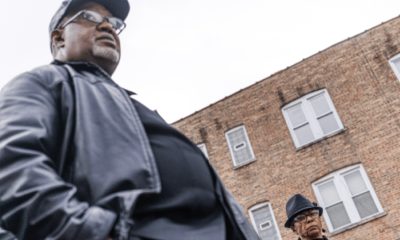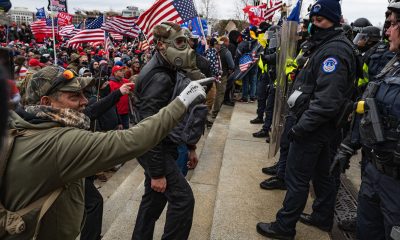Crime
OP-ED: There’s a ‘Ferguson’ near you
Michael Brown, an unarmed 18-year-old African American male in suburban Ferguson, Missouri, who had just graduated from high school and planned to start college, has joined a long line of Blacks, especially Black males, who have recently been gunned down, wrestled down and killed by white men and/or white police officers who claim “reasonable fear” or “self-defense” as their defense.
However, Chicago has experienced a rash of young Blacks in gangs killing each other over “territory” or in “retaliation,” so it’s not just whites killing young Black males.
According to the St. Louis Post-Dispatch, Brown’s stepfather, Louis Head, held a sign reading: “Ferguson police just executed my unarmed son!!!”
Police report that Brown shoved the officer into his car, tried to take his gun and a shot was fired. Obviously, there are conflicting reports so it’s premature to come to conclusions, but a full federal investigation into what happened is essential.
I understand the community’s anger, and protests are legitimate and in order, but Michael Brown’s family said things should not be made worse with looting and vandalism. That will only cloud the real issues, will not bring Michael Brown back and will not facilitate justice.
How could this happen in suburban Ferguson, Missouri? Many African Americans who grew up in St. Louis, got a good education, secured good jobs at McDonnell Douglas (now Boeing) or elsewhere, and are better off economically, moved into various suburban communities in North St. Louis County — Normandy, Florrisant, Bellefontaine Neighbors, Jennings, Berkeley (home of Cedric the Entertainer), Dellwood and elsewhere.
Ferguson is a suburban community of about 21,000 that has changed from a majority white to a 70 percent African American community. Congressman Lacy Clay represents it.
I know some of the families there, including two white families.
This is a hard working, church going and middle-to-working class community with families struggling economically to keep their heads above water. There is also a smaller but growing poor community in Ferguson. It reflects what’s happening in America generally.
When journalists and politicians speak of a dwindling middle class that’s under economic assault and a poor community that’s getting bigger, they’re talking about Ferguson. Independent of the racial demographics and dynamics of Ferguson, Missouri, there’s a “Ferguson” near you.
Since President Lyndon Johnson, there has been no significant urban, suburban, small town or rural policy to rebuild America. Thus we should not be surprised that urban and rural communities, and all points in between, have significantly deteriorated during the past 46 years of neglect.
Republicans are the party of “no” and Democrats are the party of “don’t know” because it hasn’t fought for bold ideas, policies or plans to turn us in a new direction. Policies of community development are being replaced with policies of community containment. The absence of a domestic Marshall Plan is being replaced with martial law.
Here’s America today: high unemployment and low graduation rates result in guns and drugs in and jobs out; hospitals and public schools closing; gym, art, music and trade skills taken out of our public schools; inadequate investments being made in our infrastructure with roads crumbling, bridges falling down and an outdated public transportation system; a failure to address climate change;
Denial of capital investment for entrepreneurs; abandoned homes and vacant lots; a lack of youth recreational opportunities; frivolous entertainment, texting and Twitter replacing serious news reporting, reading, writing and arithmetic; a cutback in funding and a denial of equal opportunity in public jobs such as for teachers, policemen and firemen; all of which leads to hopelessness, despair and cynicism.
Many are observing Ferguson and witnessing the anger, demonstrations, looting and vandalism and calling for quiet. But quiet isn’t enough. The absence of noise isn’t the presence of justice — and we must demand justice in Ferguson and the other “Fergusons” around America.
Too many Americans have adjusted to injustice and inequality. But injustice and inequality anywhere is a threat to justice and equality everywhere.
To allow injustice and inequality invites a Ferguson to your community. We must stand together, Black, white, brown, red, and yellow and fight for justice and equality for all. It’s the only way to avoid more Fergusons.
Activism
Oakland Post: Week of April 17 – 23, 2024
The printed Weekly Edition of the Oakland Post: Week of April 17 – 23, 2024

To enlarge your view of this issue, use the slider, magnifying glass icon or full page icon in the lower right corner of the browser window. ![]()
California Black Media
Commentary: Finding the Right Balance — Addressing Organized Retail Theft While Upholding Civil Liberties
Organized retail theft is a significant issue that impacts both consumers and businesses. While it is crucial to address theft and protect businesses from losses, we should also be mindful of safeguarding individuals’ constitutional rights, particularly the right to due process. AB 1990 by Assemblymember Wendy Carrillo, also known as the STOP Act, raises concerns about the balance between addressing theft effectively and ensuring civil liberties are upheld.

By Assemblymember Tina McKinnor | Special to California Black Media Partners
Organized retail theft is a significant issue that impacts both consumers and businesses. While it is crucial to address theft and protect businesses from losses, we should also be mindful of safeguarding individuals’ constitutional rights, particularly the right to due process.
AB 1990 by Assemblymember Wendy Carrillo, also known as the STOP Act, raises concerns about the balance between addressing theft effectively and ensuring civil liberties are upheld. This bill allows law enforcement officers to make warrantless arrests for shoplifting offenses not witnessed by the officer, as long as there is reasonable cause to believe the individual committed the crime. This bill has a dangerous potential for overreach and infringes on civil liberties, particularly the right to due process.
While the stated intention behind the STOP Act is to combat organized retail theft and protect businesses, there are valid concerns that this bill is an overreach and that existing law works, if properly enforced by our partners in law enforcement. A petty theft involving property stolen valued at $950 or less may be charged as a felony or misdemeanor (called a wobbler) if the offender has the following prior convictions: 1) at least on prior petty or theft-related conviction for which a term of imprisonment was served, and 2) a prior conviction for a serious or violent offense, for any registerable sex offense, or for embezzlement from a dependent adult or anyone over the age of 65. A misdemeanor can result in a sentence of up to one year in jail, whereas a felon can mean incarceration for 16 months, two years or three years. Let’s look at shoplifting in California. It occurs when a suspect enters a store, while that establishment is open, intending to steal property worth less than $950. The crime is considered a misdemeanor, punishable by up to six months in the county jail.
Granting officers the authority to arrest individuals based on reasonable cause, without witnessing the crime firsthand, can lead to negative consequences and possible violations of individual rights. Probable cause is the legal standard by which police authorities have reason to obtain a warrant for the arrest of a suspected criminal and for the courts to issue a search warrant. A grand jury uses the probable cause standard to determine whether or not to issue a criminal indictment. The principle behind the probable cause standard is to limit the power of authorities to conduct unlawful search and seizure of a person or its property, and to promote formal, forensic procedures for gathering lawful evidence for the prosecution of the arrested criminal. Reasonable cause does not require any of this due process and only requires that an officer reasonably believes that a crime has been committed. It is essential to find a middle ground that effectively addresses organized retail theft without compromising the fundamental rights of individuals.
California’s current laws, including the use of witness statements and surveillance evidence are sufficient for addressing suspected shoplifting and organized retail theft. California Attorney General Rob Bonta recently prosecuted Michelle Mack, a suspected organized smash and grab ringleader who paid twelve women to travel around California and commit over $8 million in retail theft at 21 different stores. AG Bonta used California’s current laws to have the suspect arrested and brought to justice.
The State of California is also making significant investments to address retail theft. Just this past year California invested an additional $267 million to combat organized retail theft. It has been less than a year and our law enforcement partners should have the opportunity to address this recent spike in retail theft crime.
Los Angeles County recently applied for and received a grant for the State of California for $15.6 million dollars to address retail theft enforcement. LA District Attorney George Gascon also recently formed an organized retail task force that partners with LA County Sheriff’s Department, Glendale, Beverly Hills, Burbank, Torrance and Santa Monica Police Departments to integrate their response to retail theft across the region. These collaborative efforts, such as those seen in initiatives like the organized retail task force in LA County, demonstrate the importance of a united approach to tackling theft while maintaining a balance between enforcement and civil liberties.
As we move forward, it is essential for policymakers, law enforcement agencies, businesses and communities to work together in finding solutions that effectively address organized retail theft without encroaching on individual rights. Ongoing evaluation and a commitment to thoughtful consideration will be crucial in navigating this challenge and fostering a safe and prosperous environment for all. Balancing the scales of justice to protect businesses while upholding civil liberties demands a comprehensive and conscientious approach from all stakeholders involved.
I am confident we can find that balance.
About the Author
Assemblymember Tina McKinnor (D-Inglewood) represents the 61st District in Los Angeles County, which includes parts of the South Bay, Inglewood, Hawthorne and Lawndale.
Activism
Oakland Post: Week of April 10 – 16, 2024
The printed Weekly Edition of the Oakland Post: Week of April 10 – 16, 2024

To enlarge your view of this issue, use the slider, magnifying glass icon or full page icon in the lower right corner of the browser window. ![]()
-

 Activism4 weeks ago
Activism4 weeks agoOakland Post: Week of March 20 – 26, 2024
-

 #NNPA BlackPress3 weeks ago
#NNPA BlackPress3 weeks agoCOMMENTARY: D.C. Crime Bill Fails to Address Root Causes of Violence and Incarceration
-

 #NNPA BlackPress4 weeks ago
#NNPA BlackPress4 weeks agoFrom Raids to Revelations: The Dark Turn in Sean ‘Diddy’ Combs’ Saga
-

 #NNPA BlackPress3 weeks ago
#NNPA BlackPress3 weeks agoMayor, City Council President React to May 31 Closing of Birmingham-Southern College
-

 #NNPA BlackPress4 weeks ago
#NNPA BlackPress4 weeks agoCOMMENTARY: Lady Day and The Lights!
-

 Activism3 weeks ago
Activism3 weeks agoOakland Post: Week of March 27 – April 2, 2024
-

 #NNPA BlackPress4 weeks ago
#NNPA BlackPress4 weeks agoBaltimore Key Bridge Catastrophe: A City’s Heartbreak and a Nation’s Alarm
-

 #NNPA BlackPress4 weeks ago
#NNPA BlackPress4 weeks agoBaltimore’s Key Bridge Struck by Ship, Collapses into Water














































